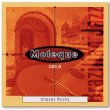|
|

Ulisses Rocha Malandro Records presents Brazilian music lovers with yet another powerful release in Brazilian contemporary instrumental music (see my previous review of Juarez Moreira's Bom Dia). Adding to the superb artistry of Ulisses Rocha, Moleque also has João Parahyba on percussion and Pedro Ivo on electric bass. The beautiful artwork on Moleque's cover comes from Genevieve Naylor, who also provided her photographs to other Malandro releases. Ms. Naylor's photographs only augment the high quality of this and similar Malandro releases. Following the tradition of other Brazilian guitarists, Ulisses Rocha could easily be put in the same category as Brazil's greatest post Bossa Nova players, such as Dilermando Reis, Raphael Rabello, and others. However, what sets Rocha apart from the others is his unique style of playing. Oscar Castro-Neves describes Rocha's "scratching noise of the nail between the plucking of the chords" as a "wonderful device" that produces a "counterpoint rhythm". Other Brazilian stars, such as Gal Costa and Cesar Camargo Mariano, have invited Rocha to perform with them. Moleque opens with Tom Jobim and Vinícius de Moraes classic bossa nova Água de Beber (Water to Drink). However, as Rocha himself explains, by mixing the jembê (a percussion instrument) with his guitar playing style, the end result is an axê pattern. This new twist to a classic song is very effective. With his own composition Patagônia, Rocha brings bossa nova chords to a playful and rich melody. It is, however, with Edu Lobo and Capinam's Ponteio, that Rocha shines above all other Brazilian guitarists. Rocha explains that in this arrangement "the guitar starts with an ostinato that takes us to the theme, reshaped and re-harmonized, emphasizing even more its innate energy". The repetition and fast tempo in this song is vital, and Rocha delivers that masterfully. With Roque Carvalho's Nossa Gente (Our People), Ulisses Rocha clearly acknowledges one of his strongest influences, Baden Powell. This arrangement will most certainly echo some of Powell's own style. Roberto Menescal and Chico Buarque's Bye Bye Brasil gets a more straightforward treatment, but by now Rocha's own style is quite evident. His improvisational interludes are phenomenal. Mixing Brazilian classics with his own compositions, Ulisses Rocha blends the old and the new with rare performances. From the liner notes and photos to the music on the CD, Moleque is excellent proof of the Brazilian tradition in acoustic guitar. Copyright © 1998 Egídio Leitão
|
| © 2011 Luna Kafé |